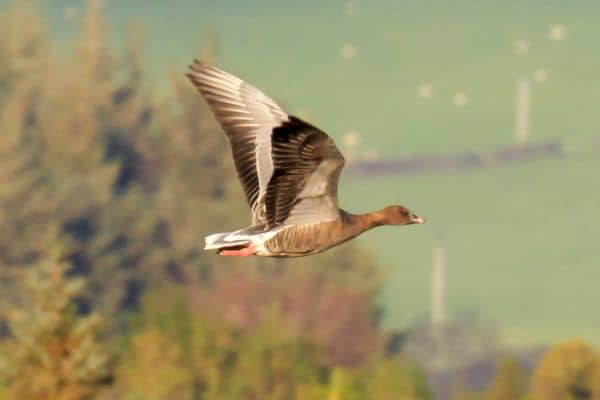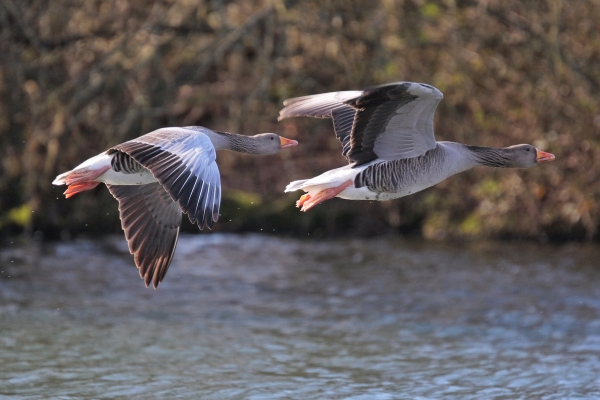
Getting their ducks in a row
As wildfowling comes under increasing pressure from changes in lifestyle and consenting arrangements, the Leicestershire Wildfowlers Association is one of several forward-looking clubs pushing the boundaries.
Get information on the legal shooting season for mammals and birds in the UK.
Apply for funding for your project or make a donation today
Comprehensive information and advice from our specialist firearms team.
Everything you need to know about shotgun, rifle and airgun ammunition.
Find our up-to-date information, advice and links to government resources.
Everything you need to know on firearms law and licensing.
All the latest news and advice on general licences and how they affect you.

As we mark World Wetlands Day 2024, BASC’s head of land management and consenting, Sarah Pinnell, explains what makes wetlands so special and pays tribute to the work carried out to protect and enhance them.
Wetlands have underpinned the development of civilisations for thousands of years, providing people with access to waterfowl, fish, other food and freshwater for crops and livestock.
The aim of World Wetlands Day, which is celebrated annually on 2 February, is to raise global awareness about the vital role of wetlands for people and planet. So let’s go back to BASC’s beginnings to see how the seeds sown in the past are taking root and flourishing, now and for the future.
BASC’s predecessor, the Wildfowlers’ Association of Great Britain and Ireland (WAGBI), was founded by Stanley Duncan in 1908 to:
WAGBI pioneered the movement to promote, maintain and protect our historic sport and wild habitats. BASC remains determined to continue this work for generations to come, thanks to the support of our 150,000 members and more than 140 members of staff.

There are a range of ways in which BASC actively assists in the creation and conservation of wetland habitats, but here in the UK and abroad.
BASC-affiliated wildfowling clubs
Strategic partnerships, such as with The Crown Estate (TCE) provide a foundation for collaborative action, fostering sustainable shooting practices and contributing to a healthier, more biodiverse future for valuable ecosystems. Wildfowling on TCE sites stretches to over 660 linear kilometres, involving 65 sporting rights leases.
Collaborative efforts ensure that wetlands are managed effectively by more than 140 BASC-affiliated clubs, contributing to biodiversity, conservation and sustainable shooting practices for the benefit of wildlife and society as a whole.
The BASC Wildlife Fund
The BASC Wildlife Fund offers financial support to shoots, clubs, syndicates and others for hands-on conservation initiatives and sustainable land management. Thanks to donations from members, the BWF provides loans for land purchase and grants for conservation projects in the UK. The BWF has also funded international projects, where these relate to UK migratory species.
Since January 2020, the BWF has awarded more than £467,000 in grants for a range of conservation projects.
Lindisfarne Permit Scheme
Lindisfarne’s wildfowling permit scheme is run by Natural England and administered in partnership with its National Nature Reserve team and BASC. The scheme demonstrates the continually developing proactive and positive working relationship between BASC and Natural England.
Described by James Green, BASC’s head of wildfowl and wetlands as “an exemplar model for the delivery of a sustainable wildfowling scheme”, the initiative continues to go from strength-to-strength. Find out more here.

BASC involvement in science, research and best practice
BASC’s evidence and environmental law team undertake and commission research on a wide variety of current and future topics that affect waterfowl. This research, and the findings it produces, helps gather data and fill knowledge gaps. This is crucial to secure the future of sustainable shooting and to safeguard and manage our valuable ecosystems.
Partnership working
BASC’s partnership work sees us operating closely with conservation organisations such as Natural England, Natural Resources Wales and the Wildfowl and Wetlands Trust (WWT). These partnerships have borne engagement opportunities with the CEO of Natural England, and initiatives such as information sharing events with local advisors from regulatory bodies. A recent event saw staff from Natural England attend WWT sites at Martin Mere and Slimbridge for the day to discuss all things wildfowling.
Representatives from BASC sit on the Natural England consenting advisory group in order to “protect the long-term future of traditional, and sustainable, wildfowling within and outside of the English protected site network to influence a measured and evidence-based approach to the consenting of wildfowling.”

As wildfowling comes under increasing pressure from changes in lifestyle and consenting arrangements, the Leicestershire Wildfowlers Association is one of several forward-looking clubs pushing the boundaries.

BASC Northern Ireland team held a Young Shots activity day at Carnview Farms Clay Target Complex.

Heather Warrender and Sophie Stafford challenge some of the myths around taking part in scientific research related to shooting.
Sign up to our weekly newsletter and get all the latest updates straight to your inbox.
© 2025 British Association for Shooting and Conservation. Registered Office: Marford Mill, Rossett, Wrexham, LL12 0HL – Registered Society No: 28488R. BASC is a trading name of the British Association for Shooting and Conservation Limited which is authorised and regulated by the Financial Conduct Authority (FCA) under firm reference number 311937.
BASC Direct Ltd is an Introducer Appointed Representative of Agria Pet Insurance Ltd who administer the insurance and is authorised and regulated by the Financial Conduct Authority, Financial Services Register Number 496160. Agria Pet Insurance is registered and incorporated in England and Wales with registered number 04258783. Registered office: First Floor, Blue Leanie, Walton Street, Aylesbury, Buckinghamshire, HP21 7QW. Agria insurance policies are underwritten by Agria Försäkring.
If you have any questions or complaints about your BASC membership insurance cover, please email us. More information about resolving complaints can be found on the FCA website or on the EU ODR platform.